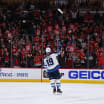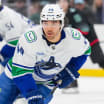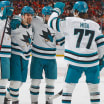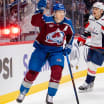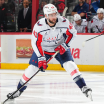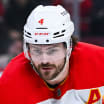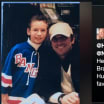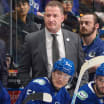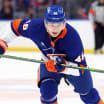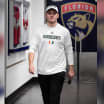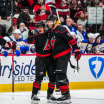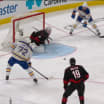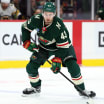Legendary hockey reporter Stan Fischler writes a weekly column for NHL.com. Fischler, known as "The Hockey Maven," shares his humor and insight with readers each Wednesday.
In conjunction with the upcoming 2022 Honda NHL All-Star Game, Fischler recalls the original NHL All-Star Game in 1934 that provided inspiration for the League sanctioning "official" All-Star games starting in 1947.
First NHL All-Star Game in 1934 played to benefit Ace Bailey
Proceeds given to Maple Leafs forward, whose career ended after hit by Bruins defenseman Shore
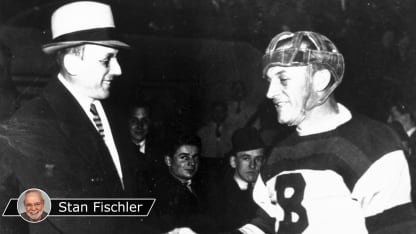
By
Stan Fischler
Special to NHL.com
The 2022 Honda NHL All-Star Game at T-Mobile Arena in Las Vegas on Saturday (3 p.m. ET; ABC, SN, TVAS) will be a far cry from the original showcase of the best players in the League. That 1934 game was a unique benefit that set the stage for future All-Star contests.
For one thing, it was not an official event sanctioned by the NHL; and for another, it was held in a more somber setting than recent celebrations. The inaugural game at Maple Leaf Gardens in Toronto was created to cover medical expenses for a seriously injured player as well as to create a trust fund for his family.
To understand the circumstances of that pioneering event, one must turn the calendar back to the 1933-34 season and focus on the intense rivalry between the Boston Bruins and Toronto Maple Leafs. In his oral history, "The Toronto Maple Leafs," author Eric Zweig put the combatants in perspective.
"Bruins owner Charles Adams liked tough hockey players," wrote Zweig. "Art Ross built Adams's team to reflect that philosophy. Conn Smythe had done the same thing in Toronto. Off the ice, Ross and Smythe hated each other, and their personal animosity was often reflected in the games between the two teams."
This never was more evident than on the night of Dec. 12, 1933 at Boston Garden. The hard-fought game turned into a tragic event in the second period. The Maple Leafs had to kill successive penalties and coach Dick Irvin dispatched defensemen King Clancy and Red Horner on the ice along with his top penalty-killer Irvine "Ace" Bailey.
"Ace was a great stickhandler, one of the smoothest men in hockey," wrote Smythe in his autobiography. "He won the face-off and ragged the puck for a whole minute while the Boston team chased him around the ice."
After another face-off, Bailey again frustrated the Bruins with his bobbing and weaving before finally firing the puck into Boston's end. The Bruins' outstanding defenseman Eddie Shore led a rush but was felled by a Clancy check. Meanwhile, the exhausted Bailey was oblivious to Shore who was behind him and out of sight.
In an interview I conducted with Maple Leafs center Joe Primeau in 1969, I sought clarity about the episode leading to Bailey's injury.
"When our Red Horner moved up the ice with the puck, Ace took up Red's position on defense," Primeau explained. "Since Ace was tired, he leaned over to catch his breath. I'll never know whether Shore mistook Ace for Horner. In any event, Shore came up and ran into Ace from the back and Ace fell and hit his head on the ice."
Smythe's aide, Frank Selke, also viewed the episode and recalled that Bailey "was upended in a backward somersault." Broadcaster Foster Hewitt added that Bailey landed on his helmetless head "with a crack that was heard around the rink."
Several brawls followed and eventually Bailey was removed to a hospital with such severe head injuries that he was considered close to death. However, after many operations his life was saved although he remained hospitalized for several weeks.
NHL Managing Director Frank Patrick suspended Shore 16 games, which amounted to one third of the season.
Bailey never played another game.
The hockey community rallied around Bailey and his family to help secure their future financially. Taking a cue from baseball, which held its first All-Star Game at Comiskey Park in Chicago the previous summer, hockey leaders decided to duplicate baseball's midseason event.
The NHL contest differed from baseball's in that all proceeds would be given to the Bailey family. NHL owners determined that the game would be played between the Maple Leafs and a team of all-stars, including two from each of the other eight teams in the League.
The game was played Feb. 14, 1934 at Maple Leaf Gardens. By that time Shore had completed his suspension and Bailey had returned to his Toronto home.
Shore was selected to play for the All-Star Team. Bailey agreed to help distribute commemorative jackets and medals to the participants, including the man who ended his hockey career.
Reporting on the Shore-Bailey meeting, Lou Marsh of the Toronto Daily Star wrote, "The first time Shore loosened up a bit was when Bailey stepped out to make the presentations. The roar that greeted Bailey, who marched out so steadily and sure-footedly, made Shore look up... He came out as second man in the lineup to get his windbreaker."
In his autobiography, Hewitt noted, "They looked at each other for a moment, then clasped hands and talked quietly. What thoughts they had or what they said was never announced. But the cordial meeting of the two stirred the crowd into wild bursts of applause."
Smythe concluded the pre-game ceremony by presenting Bailey with his own sweater. The Maple Leafs boss then announced that no Toronto player would again wear Bailey's number 6. This was the first time a player's number was retired in the NHL.
The game itself was relatively mild. Harold "Baldy" Cotton and Busher Jackson scored to give the Maple Leafs a 2-0 lead but Nels Stewart of the All-Stars cut the deficit to 2-1 with a goal. Montreal Canadiens forward Howie Morenz scored the game's most spectacular goal in the middle period.
Known for his speed, Morenz streaked past the Toronto defense and fired the puck over the shoulder of goalie George Hainsworth. The second period ended with the home team still in the lead, 4-3.
The All-Stars made a big push early in the third but Hainsworth was equal to the task and the Maple Leafs won 7-3.
Apart from the result, another fascinating and ironic aspect was the Toronto crowd's support for Shore, whose dynamic rushes constantly were applauded. In his postgame comments, Shore proved uncharacteristically humble and grateful for their reaction.
"They sure warmed my heart," Shore said. "Please thank Toronto fans for those cheers. I appreciate them more than any others I ever received."
Bailey appreciated the fact that the benefit raised a total of $20,909.40. All of it was turned over to the Bailey family. Additionally, a second benefit at Boston Garden raised another $6,000 for the retired player. Ever the gentleman, Bailey said he knew Shore's check was an accident.
In a postscript to the benefit, Bailey delivered a trophy bearing his name -- commissioned by the Maple Leafs -- to NHL President Frank Calder. The prize, which was adorned with Bailey's name, was designed to be awarded to the winner of future official NHL All-Star Games with proceeds benefiting injured players.
However, Calder never approved the gift although two other unofficial All-Star Games would be played. The first such memorial game followed the death of Morenz in 1937. Two years later another was held for the families of the late Babe Siebert, who had drowned in Lake Huron during the previous summer.
Finally, in 1947, 13 years after the Ace Bailey event, the NHL finally put its stamp on an All-Star game. It, too, was held at Maple Leaf Gardens with proceeds going to local Toronto charities and the Players' Emergency Fund. This time the All-Stars defeated the defending champion Maple Leafs, 4-3.
As for Bailey, after his bid to become an NHL linesman was rejected, he became coach of the University of Toronto hockey team. Starting in 1938 he also became a timekeeper at all Maple Leaf home games, including the first official NHL All-Star Game.
By that time Shore was owner of Springfield in the American Hockey League and remained so until the mid-1960's. Both Shore and Bailey are members of the Hockey Hall of Fame.
As Smythe said in retrospect, "Ace was as fine a gentleman as ever lived."
